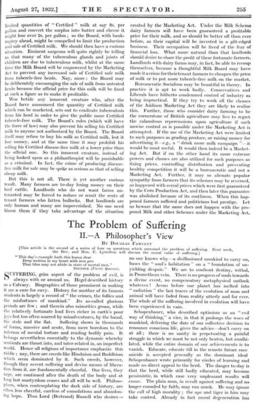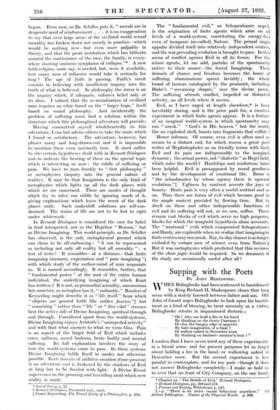The Problem of Suffering
IL—A Philosopher's View
BY DOUGLAS FAWCETT [This article is the second of a series of four on questions which surround tho problem of suffering. the Rev. and Hon. E. Lyttelton will discuss the moral value of suffering.] Next week, Deep written m my heart with iron pen That bliss may not abide in state of mortal men."
. SrzNSE1C (Faerie Queene).
SUFFERING, grim aspect of the problem of evil, is always with or around us. Hegel described history as a Calvary. Biographies of those prominent in making it are a cure .for envy. History for another of its famous students is largely a record of " the crimes, the follies and the misfortunes of mankind." Its so-called glorious periods are few ; and therein also minorities groan, while the relatively fortunate lead lives richer in earth's poor joys but too often marred by misadventures, by the banal, the stale and the fiat. Suffering shows in thousands of forms, massive and acute, from mere boredom to the infernos of mental torture and rending bodily pain. It belongs nevertheless essentially to the dynamic whereby sentients are thrust into, and inter-related in, an imperfect world. Hence all religions of importance emphasize this riddle ; nay, there are creeds like Hinduism and Buddhism which seem dominated by it. Such creeds, however, though they accent suffering and devise means of libera- tion from it, are fundamentally cheerful. Our lives, they urge, are continued after the death of the body and at long last martyrdom ceases and all will be well. Philoso- phers, when contemplating the dark side of history, are often Jess cheerful, careless of consolations and abandon- ing hope. Thus Lord (Bertrand) Russell who desires— "This day's example hath this lesson dear no one knows why—a disillusioned mankind to carry on, bases the " soul's habitation " on a " foundation of un- yielding despair." We are to confront destiny, withal, in Promethean vein. There is no progress of souls towards a divine event, no compensatory metaphysical outlook whatever ! Aeons before our planet has melted into " radiation " the last traces of the evolution of man and animal will have faded from reality utterly and for ever. The whole of the suffering involved in evolution will have been experienced in vain.
Schopenhauer, who described optimism as an " evil way of thinking," a vice, in that it prolongs the woes of mankind, deferring the date of our collective decision to renounce conscious life, gives the advice—don't carry on at all ; there is no sanity in perpetuating a painful struggle in which we must be not only beaten, but annihi- lated, while the entire domain of our achievements is to vanish. Educate, educate till in the remote future race suicide is accepted generally as the dominant ideal Schopenhauer wrote primarily for circles of learning and made no direct appeal to the herd. The danger to-day is that the herd, while still badly educated, may become pessimistic, in which case very unpleasant results will ensue. The plain man, in revolt against suffering and no longer consoled by faith; may run amok. He may ignore the call of high morality ; the ape and tiger in him may take control. Already in fact moral degeneration has begun. Even now, as Dr. Schiller puts it, " morals are in desperate need of reinforcement . . . it is no exaggeration to say that over large areas of the civilized world sexual morality has broken down not merely in practice—which would be nothing new—but even more palpably in theory, and that the great institution which has hitherto assured the continuance of the race, the family, is every- where showing ominous symptoms of collapse."* A new faith-religion, some say, is needed, but, were it available, how many men of influence would take it seriously for long ? The age of faith is passing. Faith's merit consists in believing with insufficient inquiry into the truth of what is believed. In philosophy the stress is on the inquiry which, if adequate, enforces belief only at its close. I submit that the re-moralization of civilized man requires an ethic based on the " larger hope," itself based on sound philosophy. And incidentally the problem of suffering must find a solution within the structure which this philosophical adventure will provide.
Having committed myself wholeheartedly to this adventure, I can but advise others to take the route which I found so satisfactory. The adventure, however, has phases many and long-drawn-out and it is impossible to mention these even succinctly here. It must suffice to cite certain hypotheses dealt with in Zermatt Dialogues and to indicate the bearing of these on the special topic which is interesting us now : the riddle of suffering or pain. We have to turn frankly to " first philosophy " or metaphysics (inquiry into the general nature of reality). It may be that Imaginism is the only kind of metaphysics which lights up all the dark places with which we are concerned. There are modes of thought which try to solve our riddle by ignoring much of it, giving explanations which leave the worst of the dark places unlit. Such makeshift solutions are self-con- demned. The stains of life are not to be lost to sight under whitewash.
In Zermatt Dialogues is considered the case for belief in God interpreted, not as the Hegelian " Reason," but as Divine Imagining. This world-principle, as Dr. Schiller has observed, is the only metaphysical ground which can claim to be all-embracing : " it can be represented as including not only all reality but all unreality " : a test of tests ! It resembles—at a distance—that finite imagining (memory, expectation and " pure imagining ") with which study of the surface-mind of man acquaints us. It is named accordingly. It resembles, further, that " fundamental power " at the root of the entire human individual, the underlying imagining of which Kant has written.t It is not, as primordial actuality, unconscious but conscires, as metaphor has it, " radiantly." Readers of Keyserling might describe it as " life itself." from which " objects are poured forth like sudden fancies,"t but " consciring " rather than " life " or " élan vital" stresses best the active side of Divine Imagining, spiritual through and through. Considered apart from the world-systems, Divine Imagining enjoys Aristotle's "unimpeded activity" and with that what answers to what we term bliss. Pain is an aspect of the larger field of Evil which includes error, ugliness, moral badness, brute bodily and mental suffering. Its full explanation involves the story of how the world-systems come to pass. In these systems Divine Imagining fulfils Itself in modes not otherwise possible. Each domain of additive creation (time-process) is an adventure and is darkened by the shadows of Evil at long last to be flooded with light. A Divine Event supervenes on the groaning and travailing amid which new reality is made.
* Social Decay, p. 31.
" t Zermatt Dialogues, Foreword xxii., xxiii.
Count Keyserling, The navel Diary of a Philosopher, p. 335, The " fundamental evil," as Schopenhauer urged, is the origination of finite agents which arise on all levels of a world-system, constituting the energy-foci even of inorganic (so-called) Nature. The primal single appulse divided itself into relatively independent centres, and the war pervading evolution is brought to pass. In this arena of conflict uprises Evil in all its forms. For the minor agents, let me add, partake of the spontaneity native to their source—the fontal Imagining. Their domain of chance and freedom becomes the home of suffering, abominations sprout lavishly ; the whole brood of horrors catalogued by the pessimist, including Blake's " screaming shapes," mar the divine poem. The suffering attends conflict, impeded or thwarted activity, on all levels where it occurs.
Evil, as I have urged at length elsewhere,* is born inevitably during, and is the price paid for, a creative experiment in which finite agents appear. It is a feature of an imaginal world-system in which spontaneity may run " amok." " God's in His heaven " but the world, like an exploded shell, bursts into fragments that collide !
Hence infernos. Of course, even evil is often used as means to a distant end, for which reason a great poet writes of Mephistopheles as on friendly terms with God. Evil and its pain are indispensable to the imaginal dynamic ; the actual power, not " dialectic " as Hegel held, which rules the world.t Hardships and misfortune have been helpful. Evil is presupposed by moral goodness and by the development of emotional life. Error is " the schoolmaster by whose agency there is upward evolution."1: Ugliness by contrast accents the joys of beauty. Brute pain is very often a useful sentinel and so on. Thus there are forms of evil which become good in the ample context provided by flowing time. But to dwell on these and other indispensable functions of evil and its suffering will not, as we saw, suffice. There remain vast blocks of evil which serve no high purposes, blocks for which the imaginist hypothesis alone accounts. The " irrational " evils which exasperated Schopenhauer and Hardy, are explicable when we realize that imagining in finite centres may run amok. Nay, to-day chance is no longer excluded by certain men of science even from Nature.§ But it was metaphysics which predicted that this revision of the chose jug& would be required. So we dreamers of the study are occasionally useful after all I



























 Previous page
Previous page